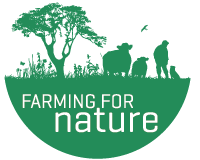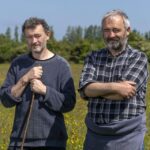Michael & Tom Keane
Tom & Michael Keane are brothers farming 135 hectares (334 ac) along a Special Area of Conservation at the Shannon Estuary in Co. Limerick. Michael focuses on dairy production whilst Tom focuses on beef and sheep.
They are big proponents of rare breeds and exclusively rear natives such as Droimeann and Shorthorn cattle and Galway sheep. Tom has been observing Droimeann traits over time to improve the herds genetics and have noted that they are low maintenance and can ‘mind themselves’. They have ‘good longevity, are fertile and have plenty of milk when crossbred’. The dairy farm has been organic for over two decades and supplies the Little Milk Company. The beef and sheep farm, also organic, supplies weanlings to finishers. Livestock are all completely grass-fed.
Their farms are located in a landscape similar to the Burren, with a vast array of habitats, including a very rare brackish lagoon situated on karst limestones. Most of the unique flora found in the Burren can be found on their land too and they have hosted many botanists and researchers interested in these rare species. They are in ACRES and are actively engaged with conservation efforts through the NPWS Farm Plan Scheme. Amongst other things, they have installed otter holts and provided accommodation for the Lesser Horseshoe Bat. Rare plants such as the Bee and Butterfly Orchids, thrive in their species rich grasslands. They propagate native trees from seed, particularly Hazel and plant them into scrub.
They both have a deep connection to nature and are incredibly knowledgeable about the ecological and cultural history of their area.
NOMINATOR: Barry O'Donoghue, National Parks and Wildlife Service
NOMINATION:
Michael and Tom Keane farm a significant holding of 135 hectares on the banks of the Shannon Estuary in Co. Limerick. It is some of the most outstanding species-rich grassland habitat in Ireland. Parts of the farm on the shoreline are designated SPA and SAC for their importance on a national and international level. The diversity and number of features on the farm, from turloughs to saltmarsh and lagoons, to copses of native trees, mature hedges, scrub, dry-stone walls and calcareous species-rich grassland, various bat species and rare butterflies, solitary bees, crayfish and much more, is something I have rarely seen in my extensive experience across Ireland.
The Keanes farm organically. Tom keeps Droimeann cattle and is one of leading forces behind the rescue and recovery of this ancient native Irish breed. He is a founder-member of the Irish Native Rare Breeds Society and is one of the founders of the Droimeann Cattle Society. Michael has a herd of Shorthorn cows (and other heritage breeds), which provide organic milk to the Little Milk Company, which Michael is a founder-member of. The Keanes also keep purebred Galway sheep, which keep Ragworth in check as well as mitigating against Redwater.
While farming productively, the Keane’s are supporting and enhancing various nature interests and safeguarding historical interests on the land, whether built heritage or social heritage. They are generous with their time and knowledge and outward looking, being involved in various groups and respected among peers in various circles whether farming or ecological. They help many landowners and farmers in sourcing native breeds for conservation management. They have invited and facilitated various ecological and historical studies on their land. The Keanes could talk to anyone about anything ranging from the trigger-fish found along the tide, to sea birds, to the DNA of the crab apples and hazel on their land or the family history of their livestock or the processing of organic cheese or the history of the medieval bawn on the land.
The Keanes are part of the NPWS Farm Plan Scheme. Much can be learned from the farming practices here. This includes specific measures for the Lesser Horseshoe Bat, where West Limerick is an important geographical outpost. In autumn, expansive swathes of land managed by the Keanes are awash with neon-purple Devils’ Bit Scabious, while at various times of the year, rare plants and orchids come into flower, including the Bee Orchid and Butterfly Orchids. Carline Thistle, St. John's Wort, Mullein, ant hills, etc. are all hallmarks of the quality of grassland habitat managed by the Keanes.
The collective dedication to farming in harmony with nature, with values for past, present and future management methods, makes the Keanes an outstanding nominee for the Farming for Nature awards. The land here is really a gem, as are the Keanes and the fact that all of this sits in a part of the country that has seen intensification and habitat loss, is a testament to what has been delivered by the Keanes.





